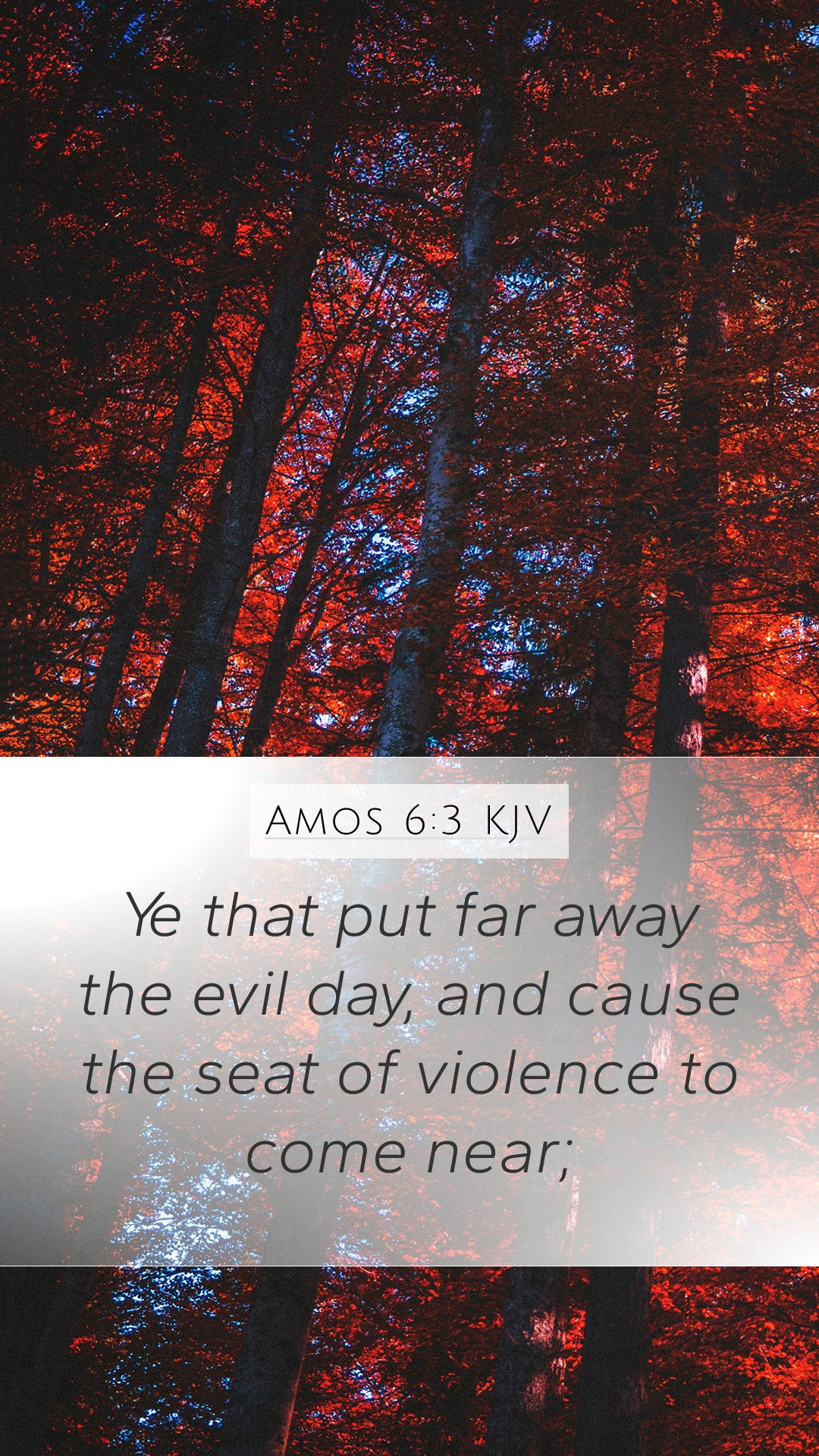Old Testament
Genesis Exodus Leviticus Numbers Deuteronomy Joshua Judges Ruth 1 Samuel 2 Samuel 1 Kings 2 Kings 1 Chronicles 2 Chronicles Ezra Nehemiah Esther Job Psalms Proverbs Ecclesiastes Song of Solomon Isaiah Jeremiah Lamentations Ezekiel Daniel Hosea Joel Amos Obadiah Jonah Micah Nahum Habakkuk Zephaniah Haggai Zechariah MalachiAmos 6:3 Meaning
What is the meaning of Amos 6:3?
Ye that put far away the evil day, and cause the seat of violence to come near;
Amos 6:3 Bible Verse Meaning
Understanding Amos 6:3
In this analysis, we will explore the meaning, interpretations, and explanations of Amos 6:3 through insights drawn from renowned public domain commentaries such as those by Matthew Henry, Albert Barnes, and Adam Clarke. This verse serves as a poignant reminder of the consequences of complacency and false security among God’s people.
Contextual Background
Amos, a prophet from the Southern Kingdom of Judah, delivers messages of judgment against the Northern Kingdom of Israel. He calls out the affluent and complacent who live in luxury while neglecting God’s commandments. Understanding this verse requires a brief exploration of the socio-political and spiritual context of Israel during this time.
Verse Analysis
Amos 6:3 states: "Woe to you who put far away the day of doom, who cause the seat of violence to come near;..." This verse serves as a stark warning against the indifference and false sense of security felt by the people of Israel. Here, we compile insights from various commentaries:
-
Matthew Henry's Commentary:
Henry emphasizes the spiritual insensitivity of the Israelites, who ignore the impending judgment of God. He notes how they place their trust in materialism and earthly security, dismissing the reality of divine wrath. He warns that such complacency can lead to dire consequences.
-
Albert Barnes' Notes:
Barnes provides an interpretation focused on the 'day of doom' as a reference to the coming judgment. He interprets the verse as a rebuke directed towards those who are oblivious to their sinful state and believe that divine retribution is distant or non-existent. This reflects a broader theme of God's imminent justice and the folly of neglecting His warnings.
-
Adam Clarke's Commentary:
Clarke highlights the emotional weight behind Amos’ words, noting that the prophet feels compelled to declare woe upon those who mislead themselves into thinking judgment will not come. Clarke suggests that the “seat of violence” symbolizes the corruption and moral decay within society, urging readers to recognize and respond to the present danger.
Key Themes and Insights
Through this verse, several key themes emerge that are crucial for Bible study groups and personal study alike:
-
Complacency in Spiritual Matters:
This verse serves as a caution against spiritual complacency. Many believers may find themselves in a place where they dismiss the seriousness of their relationship with God, affected by societal norms.
-
The Certainty of Judgment:
Amos 6:3 emphasizes the reality of divine judgment. It reminds us that dismissing God's warnings leads only to destruction. This is an essential aspect of Biblical exegesis and studying the prophetic messages found in the Old Testament.
-
Moral Integrity:
The mention of violence reflects the moral decline that can accompany neglecting God's laws. The call for personal and communal righteousness is implicit in the warnings given to the Israelites.
Applications for Daily Life
Understanding Amos 6:3 can guide our daily lives in several ways:
- Be vigilant against becoming comfortable in our faith. Regular self-examination and communal accountability can help maintain spiritual fervor.
- Recognize the significance of judgment — both temporal and eternal. Understanding God's justice encourages believers to live righteously and advocate for social justice.
- Address societal issues directly, promoting moral integrity and kindness as a reflection of God’s character in a world that often embraces violence and corruption.
Related Cross References
Amos 6:3 is closely related to several verses that enhance the understanding of its message:
- Isaiah 5:19 - Woe to those who say, “Let God hurry, let him hasten his work so we may see it.”
- Jeremiah 5:12 - They have lied about the Lord; they said, “It is not he; no harm will come to us; we will never see sword or famine.”
- Ezekiel 12:27 - The days go by and every vision comes to nothing.
Conclusion
In sum, Amos 6:3 serves as a profound warning about the dangers of complacency and the inevitable nature of divine judgment. Insightful study through resources such as commentaries provides a deeper Bible verse understanding that encourages personal reflection and communal integrity. As believers engage in Bible study lessons and utilize Bible study tools, this verse can provoke necessary dialogue about the spiritual state of the individual and the community.


